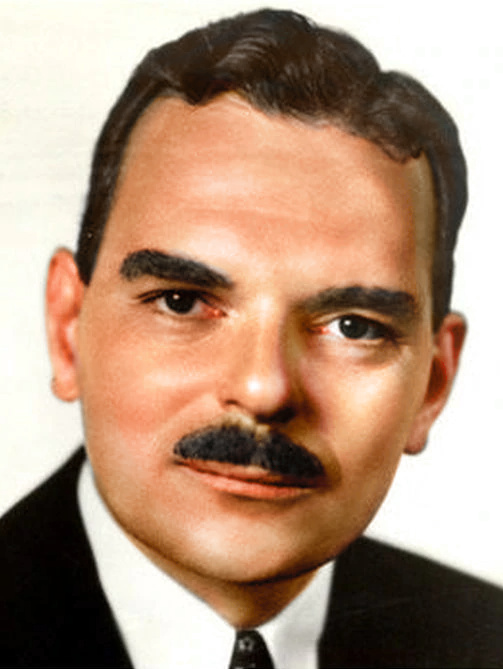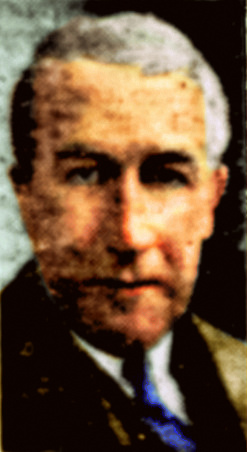Editorial: Our post-war army
…
George Norris of Nebraska, a sad-eyed, moody, often pessimistic man, was and will remain, paradoxically, a pillar of inspiration to those who would be optimistic about the future of democracy.
He was a great man, if that abused word retains its meaning. His greatness is writ large not only in America’s politics but in its very geography, Norris Dam is an enduring tribute to the father of TVA, just as the lame duck amendment to the Constitution, and Nebraska’s one-house legislature, and innumerably major acts of Congress, are monuments to his political vision and his parliamentary skill.
Franklin D. Roosevelt, in a speech at Senator Norris’ hometown, said of him:
History asks, “Did the man have integrity?”
“Did the man have unselfishness?”
“Did the man have courage?”
“Did the man have consistency?”
And if the individual under a scrutiny of the historic microscope measured up to an affirmative answer to these questions then history has set him down as great indeed in the pages of all the years to come.
And your Senator stands forth whether we agree with him on all the little details or not – he stands forth as the very perfect, gentle knight of American progressive ideals.


By Mrs. Walter Ferguson
Governor Dewey’s mustache may mark the beginning of a masculine renaissance. With the ladies it is not yet popular and he may even lose a few votes because of it. But it must be admitted that he shows courage in an era of beardless males.

Our tastes have been formed by the movies and have grown more effeminate with the years. The glamor boys stick to glamor girl patterns, and vie with the heroines in the matter of graceful contours, clean faces and marcelled hair. Although their behavior invariably is gallant and dashing, their appearance is on the softie side.
Sober reflection makes on believe that modern man may soon be forced to take up whiskers in order to preserve his ego. There’s precious little left for him. The ladies have appropriated his haircut, his pants, his liquor and tobacco, his athletics, his job and even his war. Man will have to think up something that will set him apart – and what is left except the mustache?
A few intellectuals such as Christopher Morley and Ernest Hemingway have recently sprouted full beards. At first, we put it down to literary eccentricity, but it could very well be rebellion against feminine aggression. For the first time in our history, the United States has a preponderance of females; if that condition continues, the poor men will be hard put to maintain their pose of dominance without some sharp deviation from present modes.
Mr. Dewey may deserve the title of “the New Man.”

The second of the presidential candidates to come here in this campaign, Norman Thomas, Socialist nominee, will speak at a public meeting in the Fort Pitt Hotel Thursday night.
Before the 8:00 p.m. ET rally, sponsored by local officers of the Socialist Party, Mr. Thomas will be a guest at a dinner Socialist leaders said would be given by a group of Allegheny County labor leaders.
Mr. Thomas is en route east from a tour which has taken him to the Pacific Northwest and the Midwest.
She thinks Hedy ‘too beautiful
By Maxine Garrison
…
…
…

By Ernie Pyle
In France – (by wireless)
The last time I was with the frontline medics – a battalion detachment in the 4th Division – they showed me a piece in The Stars and Stripes about Congress passing the new $10-a-month pay increase for soldiers holding the Combat Infantrymen’s Badge.
This Combat Infantry Badge is a proud thing, a mark of great distinction, a sign on a man’s chest to show that he has been through the mill. The medical aidmen were feeling badly because the piece said they were not eligible for the badge.
Their captain asked me what I thought, and so did some of the enlisted aidmen. And I could tell them truthfully that my feelings agreed with theirs. They should have it. And I’m sure any combat infantryman would tell you the same thing.
Praise for the medics has been unanimous ever since this war started. And just as proof of what they go through, take this one detachment of battalion medics that I was with.
They were 31 men and two officers. And in one seven-week period of combat in Normandy this summer, they lost nine men killed and ten wounded. A total of 19 out of 33 men – a casualty ratio of nearly 60 percent in seven weeks!
Special badge suggested
As one aidman said, probably they have been excluded because they are technically noncombatants and don’t carry arms. But he suggested that if this was true, they could still be given a badge with some distinctive medical marking on it, to set them off from medical aidmen who don’t work right in the lines.
So, I would like to propose to Congress or the War Department or whoever handles such things that the ruling be altered to include medical aidmen in battalion detachments and on forward.
They are the ones who work under fire. Medics attached to regiments and to hospitals farther back do wonderful work too, of course, and are sometimes under shellfire. But they are seldom right out on the battlefield. So, I think it would be fair to include only the medics who work from battalion on forward.
I have an idea the original ruling was made merely through a misunderstanding, and that there would be no objection to correcting it.
You must hear about my new stove. You may remember that last winter in Italy we mentioned how practical and wonderful the little Coleman gasoline stove was for soldiers in the field. Well, that remark had repercussions.
It seems the employees of the Coleman Stove Company, in Wichita, Kansas, were very pleased. It made them feel that they were doing something worthwhile for the war So, in appreciation, they decided to make up a special stove as a gift for me.
Engraved like a loving cup
We kept hearing about it over here for weeks, and waited for it the way children wait for Christmas. The other correspondents were as excited about it as I was.
At last, it came. Boy, you should see it. It is an exact duplicate of the regular stove, except that this one is all hand-made and chromium-plated and has my name engraved on it, like a loving cup.
One of the correspondents said, “You can’t light that, it’s too pretty.”
An Army colonel said, “They should have sent a fireplace and a mantel along for you to exhibit it on.”
For days there was a line of soldiers and correspondents at my tent wanting to see the stove. Twice we got ready to light it while photographers took pictures, but at the last minute we couldn’t bear to, and put it away. The boys all kidded me and said they bet I never would light it.
Necessity finally drove me to it. That was in Paris. I had given my old stove to a friend, thinking I wouldn’t need one any more. But the eating situation in Paris was drastic at first, and we had only the rations we brought with us individually.
So, at last I had to break down and light my stove in a hotel room in Paris. Some of the boys had joked and said it was so beautiful it probably wouldn’t work. But it did. It practically melted the hotel walls down.
So, to all of you who had a hand in the stove, my thanks and gratitude. But if this keeps up, I’ll have to be careful about admiring in print any Baldwin locomotives or steam-shovels.

Germans depended on ‘14 Points’ then, now they have Roosevelt’s ‘Four Points’
By William Philip Simms, Scripps-Howard foreign editor
This is the first in a series of articles on the mistakes made by the Allies at the peace table following the German surrender in 1918 – mistakes which laid the groundwork for World War II.
Washington –
The Allies have now reached Compiègne. There, on Nov. 11, 1918, occurred one of the most variously interpreted events in history. Yet a clear understanding of that event is necessary to further peace.
Today a certain magic is attributed to the formula of “unconditional surrender.” The surrender at Compiègne was unconditional. When Erzberger, Count von Oberndorff and the rest of the German mission stood before Marshal Foch in his private car on a siding in the woods, he eyed them coldly and demanded the nature of their visit.
ERZBERGER: “We have come to receive the Allied peace proposition.”
FOCH: (frigidly) “I have no proposition to make.”
OBERNDORFF: (hurriedly to forestall the gruff Erzberger) “We wish to learn what your armistice conditions are.”
FOCH: (icily) “I have no conditions to offer.”
ERZBERGER: (timidly) “But President Wilson–”
FOCH: (impatiently) “Do you or don’t you wish an armistice? If so, I am here to state the terms.”
Germans hear terms
Glumly, the Germans chorused, “Ja,” they wanted an armistice; whereupon Marshal Foch had the terms read off to them. Nor were they “soft.” On the contrary, they set the mission back on its heels. In addition to the occupation of the left bank of the Rhine, with bridgeheads, they called on the Kaiser to give up practically his entire war machine forthwith. When the Germans demurred, Marshal Foch told them they could take it or leave it and he set a time limit within which they were to answer yes or no.
Erzberger’s feeble effort to drag in President Wilson’s “14 Points” was promptly, and rightly, squelched. The 14 Points had nothing to do with the surrender of the Kaiser’s army; that had to be unconditional. The “points” were a concession to the German people and there was a tremendous difference.
Parallel situation
Today as the Allies face an almost parallel situation. Now as then, insofar as the German Army is concerned, the terms are “unconditional surrender.” But now, as then, the American President has offered generous conditions to the German people. Then, President Wilson put forward his “14 Points.” Now, President Roosevelt holds out his “Four Points” – which have something in common with the 14. President Roosevelt said:
We look forward to a world founded upon the four essential human freedoms. The first is freedom of speech… everywhere in the world. The second, is freedom of worship… everywhere in the world. The third, is freedom from want… of economy understanding which will secure it every nation a healthy peacetime life for its inhabitants… everywhere in the world. And, the fourth is freedom from fear with sweeping armaments reductions… everywhere in the world.
Patently these apply to the Germans no less than to others since “all nations” and all peoples are to enjoy them “everywhere in the world.”
There is just one difference between the Wilson and the Roosevelt formulas.
Where President Wilson used his 14 points to drive a wedge between the German masses and the Kaiser – and succeeded – President Roosevelt is putting his Four Points to no such effective use against Hitler.
TOMORROW: Why we did not occupy Berlin in 1918.
Flier forced to leap near Jap-held island ‘rides’ underseas craft for two miles
…

Detroit, Michigan (UP) –
Senator Harry S. Truman, Democratic candidate for Vice President, said today that if private industry fails to make “proper post-war use” of armament plants for peacetime production the government should operate such factories.
The Missouri Senator, bidding for workingmen’s support in President Roosevelt’s fourth-term campaign with three Labor Day speeches in this industrial area, also told a press conference that public works and unemployment insurance programs were the Democratic Party’s answer to the pinch of industrial layoffs during transition from war to peace production.